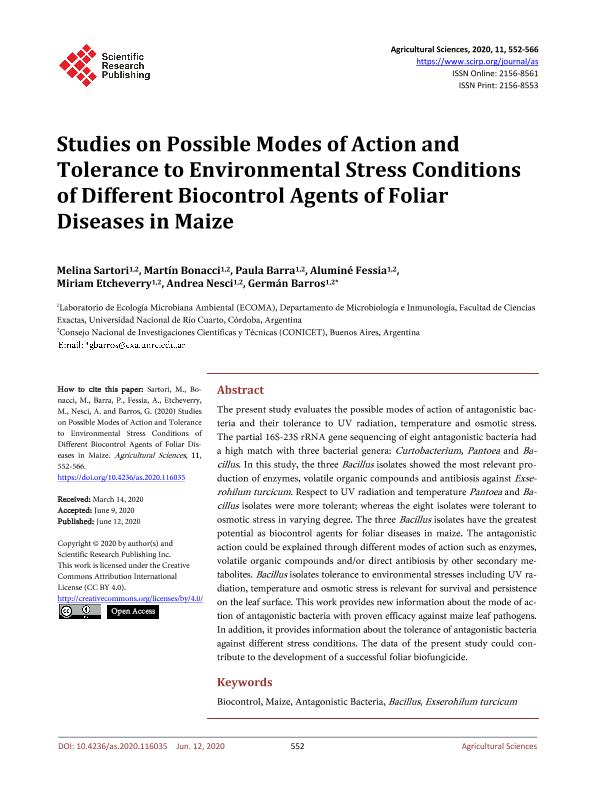Mostrar el registro sencillo del ítem
dc.contributor.author
Sartori, Melina Victoria

dc.contributor.author
Bonacci, Martin Miguel

dc.contributor.author
Barra, Paula Sabina

dc.contributor.author
Fessia, Alumine Soledad

dc.contributor.author
Etcheverry, Miriam Graciela

dc.contributor.author
Nesci, Andrea Verónica

dc.contributor.author
Barros, Germán Gustavo

dc.date.available
2021-05-12T03:43:03Z
dc.date.issued
2020-06
dc.identifier.citation
Sartori, Melina Victoria; Bonacci, Martin Miguel; Barra, Paula Sabina; Fessia, Alumine Soledad; Etcheverry, Miriam Graciela; et al.; Studies on possible modes of action and tolerance to environmental stress conditions of different biocontrol agents of foliar diseases in maize; Scientific Research Publishing; Agricultural Sciences; 11; 6; 6-2020; 552-566
dc.identifier.issn
2156-8553
dc.identifier.uri
http://hdl.handle.net/11336/131860
dc.description.abstract
The present study evaluates the possible modes of action of antagonistic bacteria and their tolerance to UV radiation, temperature and osmotic stress. The partial 16S-23S rRNA gene sequencing of eight antagonistic bacteria had a high match with three bacterial genera: Curtobacterium, Pantoea and Bacillus. In this study, the three Bacillus isolates showed the most relevant production of enzymes, volatile organic compounds and antibiosis against Exserohilum turcicum. Respect to UV radiation and temperature Pantoea and Bacillus isolates were more tolerant; whereas the eight isolates were tolerant to osmotic stress in varying degree. The three Bacillus isolates have the greatest potential as biocontrol agents for foliar diseases in maize. The antagonistic action could be explained through different modes of action such as enzymes, volatile organic compounds and/or direct antibiosis by other secondary metabolites. Bacillus isolates tolerance to environmental stresses including UV radiation, temperature and osmotic stress is relevant for survival and persistence on the leaf surface. This work provides new information about the mode of action of antagonistic bacteria with proven efficacy against maize leaf pathogens. In addition, it provides information about the tolerance of antagonistic bacteria against different stress conditions. The data of the present study could contribute to the development of a successful foliar biofungicide.
dc.format
application/pdf
dc.language.iso
eng
dc.publisher
Scientific Research Publishing
dc.rights
info:eu-repo/semantics/openAccess
dc.rights.uri
https://creativecommons.org/licenses/by/2.5/ar/
dc.subject
BIOCONTROL
dc.subject
MAIZE
dc.subject
ANTAGONISTIC BACTERIA
dc.subject
BACILLUS
dc.subject
EXSEROHILUM TURCICUM
dc.subject.classification
Agricultura

dc.subject.classification
Agricultura, Silvicultura y Pesca

dc.subject.classification
CIENCIAS AGRÍCOLAS

dc.title
Studies on possible modes of action and tolerance to environmental stress conditions of different biocontrol agents of foliar diseases in maize
dc.type
info:eu-repo/semantics/article
dc.type
info:ar-repo/semantics/artículo
dc.type
info:eu-repo/semantics/publishedVersion
dc.date.updated
2020-10-15T14:06:52Z
dc.identifier.eissn
2156-8561
dc.journal.volume
11
dc.journal.number
6
dc.journal.pagination
552-566
dc.journal.pais
Estados Unidos

dc.description.fil
Fil: Sartori, Melina Victoria. Universidad Nacional de Río Cuarto. Facultad de Ciencias Exactas, Fisicoquímicas y Naturales. Departamento de Microbiología e Inmunología; Argentina. Consejo Nacional de Investigaciones Científicas y Técnicas. Centro Científico Tecnológico Conicet - Córdoba; Argentina
dc.description.fil
Fil: Bonacci, Martin Miguel. Universidad Nacional de Río Cuarto. Facultad de Ciencias Exactas, Fisicoquímicas y Naturales. Departamento de Microbiología e Inmunología; Argentina. Consejo Nacional de Investigaciones Científicas y Técnicas. Centro Científico Tecnológico Conicet - Córdoba; Argentina
dc.description.fil
Fil: Barra, Paula Sabina. Universidad Nacional de Río Cuarto. Facultad de Ciencias Exactas, Fisicoquímicas y Naturales. Departamento de Microbiología e Inmunología; Argentina. Consejo Nacional de Investigaciones Científicas y Técnicas. Centro Científico Tecnológico Conicet - Córdoba; Argentina
dc.description.fil
Fil: Fessia, Alumine Soledad. Universidad Nacional de Río Cuarto. Facultad de Ciencias Exactas, Fisicoquímicas y Naturales. Departamento de Microbiología e Inmunología; Argentina. Consejo Nacional de Investigaciones Científicas y Técnicas. Centro Científico Tecnológico Conicet - Córdoba; Argentina
dc.description.fil
Fil: Etcheverry, Miriam Graciela. Universidad Nacional de Río Cuarto. Facultad de Ciencias Exactas, Fisicoquímicas y Naturales. Departamento de Microbiología e Inmunología; Argentina. Consejo Nacional de Investigaciones Científicas y Técnicas. Centro Científico Tecnológico Conicet - Córdoba; Argentina
dc.description.fil
Fil: Nesci, Andrea Verónica. Universidad Nacional de Río Cuarto. Facultad de Ciencias Exactas, Fisicoquímicas y Naturales. Departamento de Microbiología e Inmunología; Argentina. Consejo Nacional de Investigaciones Científicas y Técnicas. Centro Científico Tecnológico Conicet - Córdoba; Argentina
dc.description.fil
Fil: Barros, Germán Gustavo. Universidad Nacional de Río Cuarto. Facultad de Ciencias Exactas, Fisicoquímicas y Naturales. Departamento de Microbiología e Inmunología; Argentina. Consejo Nacional de Investigaciones Científicas y Técnicas. Centro Científico Tecnológico Conicet - Córdoba; Argentina
dc.journal.title
Agricultural Sciences
dc.relation.alternativeid
info:eu-repo/semantics/altIdentifier/doi/http://dx.doi.org/10.4236/as.2020.116035
dc.relation.alternativeid
info:eu-repo/semantics/altIdentifier/url/https://www.scirp.org/journal/paperinformation.aspx?paperid=100856
Archivos asociados
